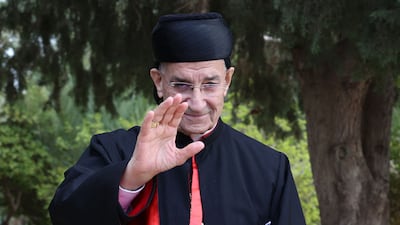The head of Lebanon's Maronite Church called for state control over weapons on Sunday, days after a deadly skirmish between residents of a Christian village and members of the heavily armed Hezbollah militia.
A member of the Shiite group and a Christian resident were killed in a brief exchange of fire on Wednesday after a Hezbollah lorry carrying ammunition overturned while passing through the village of Kahaleh, near Beirut.
In his sermon on Sunday, cleric Patriarch Bechara Al Rai called for "all parties" and other elements of the country "to unite under the banner of the state, especially regarding the use of weapons".
Hezbollah, founded by Iran's Revolutionary Guards in 1982, is the only Lebanese militia to continue bearing arms after the end of the country's 1975-1990 civil war.
"It is impossible to live on one land with two states, two armies, two authorities and two sovereignties," Lebanon's National News Agency quoted the Patriarch as saying.
Hezbollah, founded by Iran's Revolutionary Guards in 1982, is the only Lebanese militia to retain its weapons after the end of the country's 1975-1990 civil war. Its arsenal has long been a point of conflict in Lebanon, where its opponents accuse the group of undermining the state.
The shooting in Kahaleh, the deadliest confrontation between the Hezbollah and Lebanese who oppose it since clashes in Beirut two years ago, raised the fear of wider violence in a country already struggling with a crippling economic crisis and a political vacuum.
Cardinal Al Rai, who regularly speaks out about Lebanon's problems, also touched on the parliament's failure to elect a successor to former president Michel Aoun nearly 10 months after his term ended.
"The failure to elect a president since last September is unjustified, seeing as he is the guarantor of state institutions' revival and the preserver of the coexistence formula," the Patriarch said.
Under Lebanon's sectarian power-sharing system, the presidency is held by a Christian, while the prime minister must be a Sunni and the Speaker of Parliament a Shiite.

